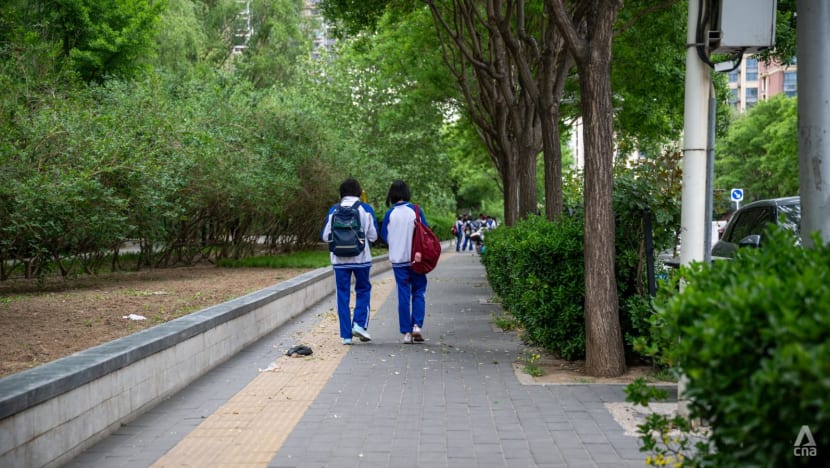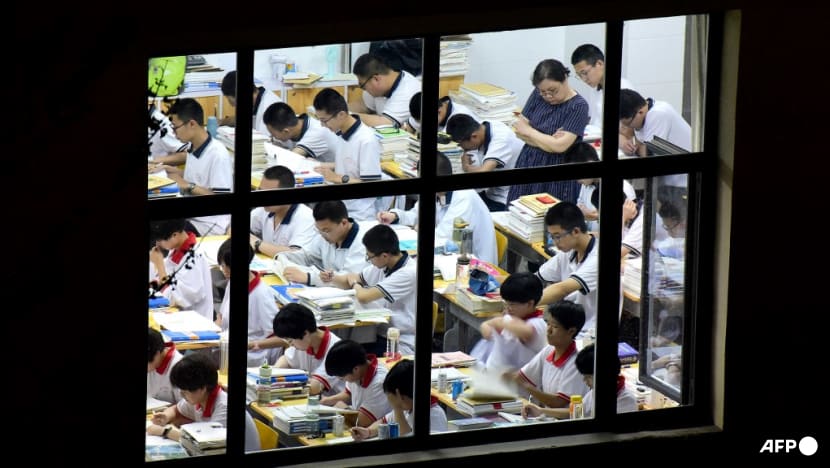Longer hours, better grades? China pushes weekend breaks for high school students, parents push back
Education authorities are enforcing full weekends off to boost student welfare. But with the gaokao - the all-important national college entrance exam - approaching in June, many final-year students still get just one rest day a week, or even every two weeks.


This audio is generated by an AI tool.
SINGAPORE: The school day begins just after 7.30am and ends past 9.40pm, well after nightfall.
Two breaks punctuate the gruelling 14-hour study stretch - a two-hour lunch recess and a one-hour dinner break.
This is the rhythm of academic life for Nian Nian (not her real name), a second-year high school student in China’s Yichun city in south-eastern Jiangxi province.
"My days in school are spent doing almost nothing but studying,” the 17-year-old told CNA.
But she has a welcome reprieve for two days each week, being given the full weekend off.
On paper, all high schools in China are supposed to put in place this practice of “shuangxiu”, as it is called in Chinese. The term literally means double rest.
That hasn’t been the case. And now, the matter has come under the spotlight after recent enforcement efforts by education authorities ahead of the gaokao, the fiercely competitive national college entrance examination held in early June.
But it’s also garnered mixed reactions, laying bare the challenges in balancing student welfare and academic performance, especially with the gaokao widely seen as a gatekeeper of opportunity.
SCHOOLING ON WEEKENDS
China’s push for a five-day school week dates back decades.
A 1995 circular by the State Council stipulated that all primary and secondary schools should implement a five-day school week.
Fast forward to 2022, when the education ministry stated that high schools should not organise classes or tutoring sessions during weekends.
Since mid-April this year, the ministry has publicly punished some high schools for having classes on weekends.
According to local news reports, three high school administrators in Henan have been removed from their posts, four schools in Jiangsu have had their honorary titles removed, and several schools in Hebei have been excluded from receiving awards for three years.
Still, the reality is that many high schools across China continue to hold weekend classes, especially for final-year students preparing for the gaokao.
It is common for these students to have just one rest day a week, or even one every fortnight.
“No school is alike, even schools in the same districts have different practices,” said Nian Nian.
The gaokao is widely seen in China as a make-or-break exam. Do well, and you have a high chance of entering a prestigious university, forging a pathway to a bright career. Do badly, and you’re seen as second-rate, with limited college and job prospects.
Justified or not, this often results in a pressure-cooker environment - not just for the students, but for parents and teachers too. A record 14.4 million students will sit for the test this year.
Intense academic pressure and overly long study hours have led to insufficient sleep and leisure time for students, and even academic burnout and psychological issues, Liu Changming from the Chinese Society of Education, also a former high school principal, told local news site The Paper.
More than 40 per cent of high school students in China experience depression, according to a 2023 mental health report cited by state broadcaster CCTV.

WORKING FOR STUDENT WELFARE
The renewed push to enforce a full weekend off for high school students has sparked debate.
Students and educators have welcomed the move in providing high school students with much-needed rest.
Yu (not her real name), 19, from Guangdong province, sat for the gaokao last year. She told CNA that as a third-year student, she only had one rest day a week. Twelve-hour school days were also the norm.
Even then, there would still be students returning to school on rest days to study, Yu said.
Out of the 55 students in her class, 10 on average would head to school to study, citing unconducive home environments or “passion about learning”, Yu said.
Yu was not among them, instead opting to stay home and occasionally listen to online classes. "I needed rest," she said.
Her experience echoes accounts in local media, which have cited examples of high school students welcoming full weekends off.
"With more rest on weekends, I am now more energetic during weekdays," Long Qianxun, a 16-year-old freshman in Changsha, Hunan, told local news outlet China Daily.
Retired high school teacher Li Shengli is also a strong proponent of shuangxiu.
“It allows the students to get proper rest. If they have classes from Monday to Saturday without a break, they get no breathing space,” Li, who taught politics in a high school in Shenzhen’s Futian district, told CNA.
“In my view, effective learning depends on students’ self-discipline,” said the 61-year-old, who retired last year after 40 years of teaching.
With a two-day weekend break, Li said students can identify their weaker subjects and make up for the gap. They can also use the break to review or consolidate what they have learned during the week.
“I think this approach is quite good. I don't really agree with exhaustion-based learning strategies,” he said.
At the same time, Li acknowledged that from the perspective of a parent, there would be the fear of their child “missing out” on their studies with a two-day weekend break.
“I would have to consider that my own child is relaxing, but other children aren’t, which means my child is missing out. Parents do have that mindset,” he said.
“Third-year students do require breaks, they want the breaks. But from what I see, there’s still a difficulty in eliminating classes on Saturdays, and the pressure mainly comes from the parents.”
Li shared how, during the winter break, especially during the pandemic, classes would be cancelled. Yet, some anxious parents would contact the school requesting remedial classes for their children.
“As teachers, we hope that the children get to rest,” Li said.
“It’s heartbreaking to see the children exhausted … they may be physically present, they’re not fooling around, but their learning efficiency is plummeting.”



















